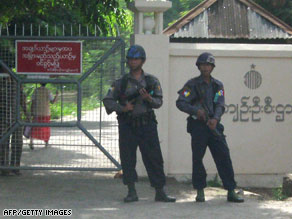
The trial of Myanmar opposition leader Aung San Suu Kyi — a proceeding that nine Nobel laureates have called "a mockery" — entered its second day Tuesday.
Prosecutors continued their questioning of the 22 witnesses they have called. Two of Suu Kyi’s maids and an American man who recently swam to her lakeside home also are on trial. At the end of the first day, Monday, the court had heard from only two of the witnesses. Diplomatic sources say the government might drag out the legal proceedings for several months, until the media loses interest — and then quietly extend Suu Kyi’s detention well beyond next year’s planned elections. The 1991 Nobel Peace Prize winner has been under house arrest for 13 of the past 19 years — a confinement that the military junta has regularly extended. The latest extension expires later this month, and Suu Kyi’s supporters say the trial provides the government an excuse to continue restricting her movement. Watch more on Suu Kyi’s trial » “The trial is a mockery,” the nine Nobel Peace prize winners said in a letter to U.N. Secretary-General Ban Ki-moon on Monday, urging him to intervene. “There is no judicial system in Burma,” the letter said. “It is clear that this is an excuse by the military junta to add trumped-up charges at a time when Daw (an honorific) Aung San Suu Kyi’s unlawful detention was scheduled to end May 27, 2009.” Signatories to the letter included Costa Rican President Oscar Arias and Archbishop Desmond Tutu. The southeast Asian country was known as Burma before the military government changed it to Myanmar. The case is being tried behind closed doors inside a prison compound near Yangon. Police put up roadblocks outside, and turned away a group of Western diplomats who wanted to attend Monday.
Don’t Miss
Lawyer: Suu Kyi’s prison is ‘notorious, filthy’
Neighbors describe man at center of Suu Kyi case
Aung San Suu Kyi: Myanmar’s democracy face
Blog: Trial will change nothing for oppressed Myanmar
In depth: Myanmar: Two days, two tragedies
On Tuesday, however, a U.S. Embassy official was allowed to watch the proceedings. Also Tuesday, the government-controlled local media made its first mention of the trial — after carrying no reports about it before it began, or on its first day. The trial is expected to last about three months, said Nyan Win, a spokesman for Suu Kyi’s National League for Democracy. Suu Kyi, 63, and two of her maids have been detained under Section 22 of the country’s legal code — a law against subversion. If convicted, Suu Kyi could face three to five years in prison. The charges stem from May 3, when an American, John William Yettaw, allegedly swam almost two miles across the lake behind Suu Kyi’s crumbling, colonial-era home and stayed for two days. The government said Yettaw presence in the closely guarded home violated the conditions of Suu Kyi’s house arrest. Watch former U.S. president Jimmy Carter discuss Aung San Suu Kyi » The country’s regime rarely allows Suu Kyi any visitors, and foreigners are not allowed overnight stays in local households without government permission. Yettaw, a 53-year-old former military serviceman from Falcon, Missouri, is charged with violating immigration laws and trespassing in a restricted area. The charges carry a maximum sentence of five years in prison. A lawyer selected by the U.S. Embassy is representing him. Suu Kyi’s lawyers are expected to argue that the pro-democracy advocate knew nothing about the American’s plan to visit her and that she tried in vain to get him to leave. The defense also will try to turn the charges on their head, arguing that the government has failed to protect Suu Kyi. “Frankly, she does not believe she did any offense,” said Jared Genser, a Washington, D.C.-based lawyer who is one of the attorneys defending her. Another lawyer, U Kyi Win, said Yettaw refused to leave — first saying he didn’t want to swim in daylight for fear of being captured, and later blaming leg cramps. Suu Kyi didn’t tell authorities about the visit because she didn’t want get Yettaw or anyone else in trouble, U Kyi Win said. The Nobel laureate has been the face of Myanmar’s pro-democracy movement and the focus of a global campaign to free her. Her National League for Democracy party won over 80 percent of the legislative seats in 1990. She was disqualified from serving because of her house arrest, and the military junta ignored the results.
The government has said next year’s scheduled elections will re-introduce democracy in Myanmar. But its plan includes a clause that forbids citizens who bore children with foreigners from running for office. This makes Suu Kyi ineligible. She married a British man and has two sons with him.
